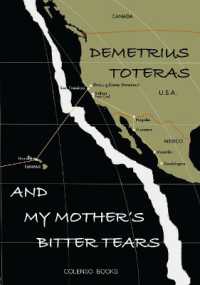- ホーム
- > 洋書
- > 英文書
- > Politics / International Relations
基本説明
New in paperback. Hardcover was published in 2006. Examines patterns of change and continuity in American foreign policy strategy.
Full Description
In Reluctant Crusaders, Colin Dueck examines patterns of change and continuity in American foreign policy strategy by looking at four major turning points: the periods following World War I, World War II, the Cold War, and the 9/11 terrorist attacks. He shows how American cultural assumptions regarding liberal foreign policy goals, together with international pressures, have acted to push and pull U.S. policy in competing directions over time. The result is a book that combines an appreciation for the role of both power and culture in international affairs. The centerpiece of Dueck's book is his discussion of America's "grand strategy"--the identification and promotion of national goals overseas in the face of limited resources and potential resistance. One of the common criticisms of the Bush administration's grand strategy is that it has turned its back on a long-standing tradition of liberal internationalism in foreign affairs. But Dueck argues that these criticisms misinterpret America's liberal internationalist tradition. In reality, Bush's grand strategy since 9/11 has been heavily influenced by traditional American foreign policy assumptions.
While liberal internationalists argue that the United States should promote an international system characterized by democratic governments and open markets, Dueck contends, these same internationalists tend to define American interests in broad, expansive, and idealistic terms, without always admitting the necessary costs and risks of such a grand vision. The outcome is often sweeping goals, pursued by disproportionately limited means.
Contents
Acknowledgments ix INTRODUCTION: Change and Continuity in American Grand Strategy 1 CHAPTER ONE: Power, Culture, and Grand Strategy 9 CHAPTER TWO: Strategic Culture and Strategic Adjustment in the United States 21 CHAPTER THREE: The Lost Alliance: Ideas and Alternatives in American Grand Strategy, 1918-1921 44 CHAPTER FOUR: Conceiving Containment: Ideas and Alternatives in American Grand Strategy, 1945-1951 82 CHAPTER FIVE: Hegemony on the Cheap: Ideas and Alternatives in American Grand Strategy, 1992-2000 114 CONCLUSION: The American Strategic Dilemma 147 Notes 173 Index 215








